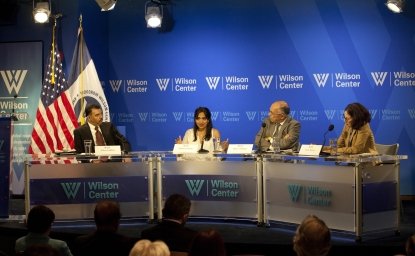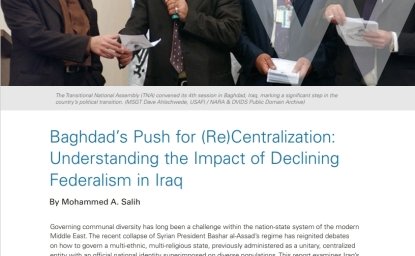From Tribe to Nation: Iraqi Kurdistan on the Cusp of Statehood


Introduction excerpt (see PDF or Scribd link below for full publication):
“For better or worse, it is hard to escape [the] conclusion that future of Iraqi Kurds lies with their integration into Iraqi state […] In terms of regional stability, it is probably preferable that [the] Kurdish independence movement does not succeed.” Thus opined an American diplomat stationed in Baghdad in a secret cable dated July 1, 1973.¹
Forty-three years on, official U.S. policy—that Iraq needs to remain territorially intact—has not changed. But there is growing recognition that after decades of dogged, if at times unorthodox, efforts to build their own state, the Iraqi Kurds are on the cusp of formally declaring independence. It is no longer a matter of “if” but “when.”
And the United States, as much as Iraq’s neighbors—Iran, Turkey, and Syria, which have restive Kurdish populations of their own—needs to be ready when Iraqi Kurdistan, the first real Kurdish state in the modern sense, is born. Most importantly, so do the Kurds.
It will be a premature birth on many counts. The Kurdistan Regional Government (KRG) remains at war against jihadists of the so-called Islamic State (ISIS). Collapsing oil prices have bankrupted the KRG’s rentier economy together with that of the rest of Iraq. The influx of more than a million internally displaced people (IDPs) as well as Syrian refugees has compounded the KRG’s financial burden and sharpened ethnic fissures. Corruption and nepotism are endemic. Distrust and rivalry between the two main political parties, the Kurdistan Democratic Party (KDP) and the Patriotic Union of Kurdistan (PUK), remain acute, allowing Turkey and Iran—the regional hegemons—to play the two sides against each other. Iraqi Kurdistan is landlocked and will always feel pressure from its neighbors.
Meanwhile, the war between the Turkish state and the Kurdistan Workers’ Party (PKK), the other main Kurdish bloc that sprang from Turkey, has resumed after a more than two-year lull. Turkish fears have been stoked by the fact the PKK has gained control over a big chunk of territory in neighboring Syria in the wake of civil conflict there. The KDP-dominated Iraqi Kurdish government does not need much goading from Turkey to side with it against the PKK. This is because the Turkish Kurdish rebels are now staking claim to parts of Iraqi Kurdistan as well. KDP leaders have vowed to eject them by force if need be. A dustup is brewing.3
One must also consider the central Iraqi government in Baghdad. Can a deal be struck with the Iraqis over new borders, oil wealth, and, just as critically, water sharing? And how will Turkey and Iran react, knowing that without their assent, life for the infant state could be truly miserable, if not impossible?
Turkey or Iran may expect the Iraqi Kurds to help them suppress their own Kurds in exchange for recognition, but this is unlikely to happen. Regardless of what their leaders think, ordinary Kurds are no longer willing to spill each other’s blood. Nationalism has overtaken tribalism in the Kurdish psyche.
Finally, and most crucially, what will the U.S. government do? Without ironclad U.S. security guarantees, an independent Kurdistan is unlikely to survive. Iraqi Kurdish leaders have openly hinted they would welcome American bases in their planned state. Many hope that just as the United States recognized Kosovo’s independence when presented with the fait accompli, it will do the same for Iraqi Kurdistan.
The challenges are multiple, complex, and, many would argue, insurmountable. An independent Iraqi Kurdistan will be in a prolonged state of incubation for sure. Yet, it has been over a century in the making and despite the obstacles, to some of its leaders at least, it finally seems within reach. Iraq’s estimated five million Kurds have been governing themselves for the past 25 years. They formally achieved federal status in 2005. Unlike the Turkish and Iranian states, the Iraqi state is weak. Syria’s Kurds have made big gains, but their future is far less certain.
Iraq’s Kurds have significant energy resources and large Western oil companies are developing them already. They have well-established diplomatic ties; all five permanent members of the UN Security Council have consulates in Iraqi Kurdistan as well as significant economic interests in the region. Israel has already declared it would recognize an independent Iraqi Kurdistan.4 Turkey, once a formidable foe, is now Iraqi Kurdistan’s fastest friend. And, in Washington, the Iraqi Kurds enjoy the support of Republicans and Democrats alike.
It is too early to say what effect an independent Kurdistan will have on the region. If the Iraqi Kurds get it right, the new state could well become a force for stability and a showcase for democratic governance where Kurds and non-Kurds, Muslims and non-Muslims, men and women, can prosper equally.
The notion that the Iraqi Kurds should be denied a state because this would further fan the flames of separatism in Iran and Turkey is morally and logically flawed. It is up to Turkey and Iran to offer their own Kurds a good enough deal to lay down their arms. Peace in either Turkey or Iran is not for the Iraqi Kurds to deliver. The same goes for Syria.
The Iraqi Kurds have endured far greater horrors and betrayal than any of their brethren across the borders. Their will for independence is unremitting. It is ultimately up to the Iraqi Kurds themselves to ensure that their long-awaited state is not stillborn.
Author
Columnist for the independent Turkish online news portal Diken as well as for Al Monitor, a Washington DC based online news outlet covering the Middle East; Turkey Correspondent, The Economist (1999-2015)

Middle East Program
The Wilson Center’s Middle East Program serves as a crucial resource for the policymaking community and beyond, providing analyses and research that helps inform US foreign policymaking, stimulates public debate, and expands knowledge about issues in the wider Middle East and North Africa (MENA) region. Read more

Explore More
Browse Insights & Analysis
Iraq Should Consider Extending UNAMI’s Mission


